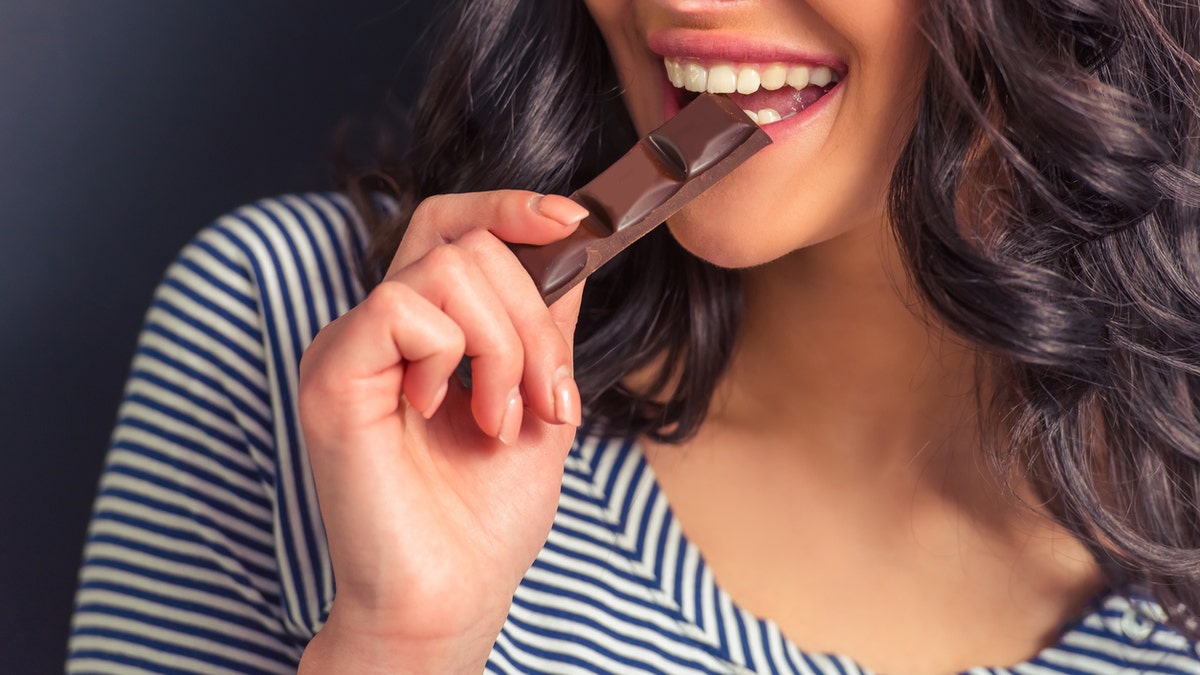
Cropped image of attractive girl eating chocolate and smiling, against dark background (iStock)
Young people could be putting their health at risk by following dieting fads such as going dairy free, experts have warned.
A survey by the National Osteoporosis Society found a fifth of under-25-year-olds are cutting out or reducing dairy in their diet, which can be dangerous if they do not get enough calcium from other sources.
6 TIPS FOR MAKING CARBS A HEALTHY PART OF YOUR DIET
The charity said that many young people take their dietary advice from bloggers and while some of it is sound, it is not always based on science and may not be right for everyone.
Here, Sun nutritionist Amanda Ursell sorts fact from fiction and answers eight of the most common questions about our diets.
Does grapefruit help with weight loss?
The grapefruit diet was created in the 1920s and has been praised by celebrities like Kylie Minogue. But scientists at Oxford University found no difference in weight between groups taking grapefruit or a placebo.
Is chocolate a health food?
Chocolate is low on the glycaemic index, which measures how quickly carbohydrates are digested and how quickly they raise the level of blood sugar.
Chocolate squeaks into the low-GI bracket because digestion of the 24g of sugar in a 50g bar is slowed down by the 15g of fat it also provides.
But it will never be the same as a bowl of strawberries, so keep it as a treat.
5 REASONS DRINKING IN MODERATION IS GOOD FOR YOU
Which kind of milk has the most calcium?
Full-fat, 2 percent and skim milk all contain roughly the same amount of calcium, as the bone-building mineral is found in the watery part of milk, not the fatty part.
So when fat is removed for 2 percent and skim milk, none of this vital mineral is lost.
Does eating celery use more calories than it holds?
There is little scientific evidence either way for this claim. But given that a stick of celery provides just two calories, the numbers really aren’t worth worrying about.
If you enjoy it, eat it. If you don’t, choose another vegetable you like.
Are all processed foods bad for you?
Not always. Whole-wheat bread and pasta, natural yogurt, oats, and frozen vegetables all undergo processing – and these foods are not considered bad for us.
In fact, some processed foods, such as red kidney beans, are better for you than before they are treated.
On the other hand, overly refined processed foods, such as cakes, pies, and cookies, should be limited.
Could my diet be giving me pimples?
Good news – there is no strong conclusive evidence that chocolate or dairy products cause acne. Dark chocolate provides antioxidants that may actually help to protect the skin.
For healthy skin, you should drink plenty of water and eat a balanced diet.
Foods with vitamins A, C and E, zinc, riboflavin, niacin, pyridoxine and selenium will also help.
FOR A BETTER COMPLEXION, TRY 'SALTY' YOGA
What is the best source of calcium?
Dried fruits, beans, and seeds do contain calcium.
But they also have substances known as oxalates and phytates that grab on to the calcium they contain and reduce how much you can absorb.
The British Dietetic Association advises that they should not be used as your main source of calcium.
Milk, yogurt, almond milk and fortified oat, rice and soy milk are much better sources.
How much oily fish should I eat?
We should have at least two portions of fish a week, including one serving (about 5 oz) of oily types such as salmon and mackerel. Oily fish is full of omega-3 essential fats, which are good for our hearts and the nervous systems of babies and children.
But some oily fish contain low levels of pollutants that build up, so pregnant or breastfeeding women are advised to stick to a maximum of two servings per week.
FOLLOW US ON FACEBOOK FOR MORE FOX LIFESTYLE NEWS








































